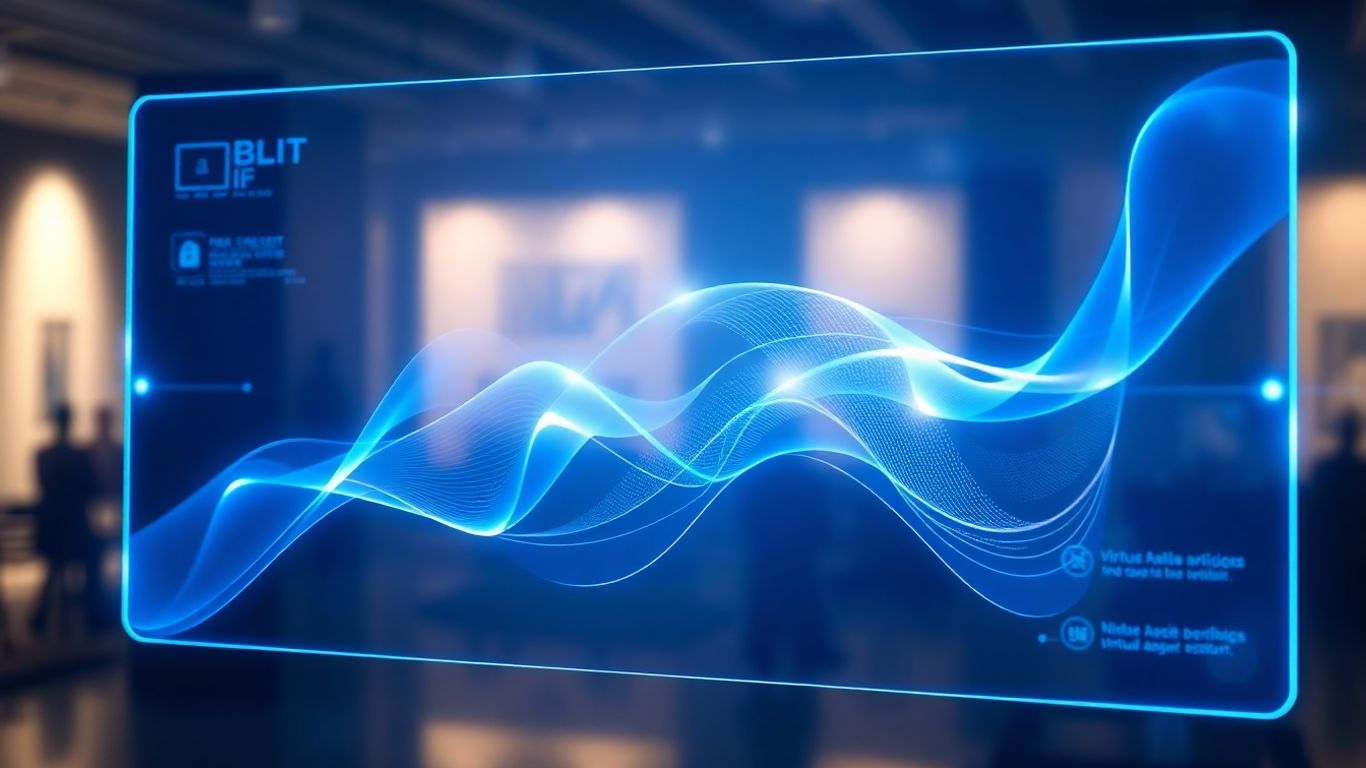[ newsletter ]
Stay ahead of Web3 threats—subscribe to our newsletter for the latest in blockchain security insights and updates.
Thank you! Your submission has been received!
Oops! Something went wrong. Please try again.
Discover the top AI virtual assistant services for your business in 2025. Enhance productivity and efficiency with cutting-edge AI solutions.





It feels like just yesterday we were marveling at how our phones could set reminders. Now, in 2025, AI virtual assistant services are everywhere, quietly handling tasks that used to eat up our day. Whether you're trying to get a handle on your schedule, need help drafting an email, or just want to automate some of the repetitive stuff, there's likely an AI assistant out there ready to lend a digital hand. But with so many options popping up, how do you pick the right one for your business? We've looked at a bunch of them, and let's just say, not all AI assistants are created equal. This article breaks down some of the top AI virtual assistant services that can actually make a difference in your day-to-day operations.
Remember when virtual assistants were mostly just glorified voice-activated search engines? Yeah, those days feel like ancient history now. By 2025, AI virtual assistants have really transformed into something else entirely. They’re not just responding to commands anymore; they’re actually anticipating what you might need before you even realize it yourself.
Think about it: back in 2020, asking your assistant to schedule a meeting was a big deal. Now, an AI assistant can look at your calendar, see you have back-to-back meetings, notice you haven't eaten, and proactively suggest rescheduling a less important one. It’s that kind of contextual awareness and predictive capability that sets today’s assistants apart. This leap forward really started gaining serious momentum with the advancements in large language models, which improved how well these systems understand natural language. Suddenly, they could grasp intent, remember past conversations, and respond in ways that feel much more human.
What really defines these modern AI assistants are a few key abilities:
The biggest difference between a basic chatbot and a true AI assistant is memory and context. A chatbot might forget you the moment you close the window, but an AI assistant remembers you mentioned your daughter’s recital last month and reminds you to leave early for traffic.
It’s a big shift from just asking for the weather to having a digital partner that genuinely helps manage your day. The goal is to make your life easier and more productive, and by 2025, they’re getting remarkably good at it.

Remember when virtual assistants were mostly just glorified voice-activated search engines? It feels like a lifetime ago, doesn't it? Back in 2020, asking your assistant to do anything more complex than setting a timer or playing a song was often a recipe for frustration. They could barely keep up with simple commands, let alone understand context or remember previous conversations.
Fast forward to today, and the transformation is pretty wild. The big leap really started happening around 2022 with the widespread adoption of advanced large language models. Suddenly, AI assistants could grasp intent, follow multi-turn conversations, and even pick up on subtle cues in your voice. It’s like they went from being a basic tool to a genuinely helpful partner.
Here’s a quick look at some key changes:
The shift from simple command-response systems to proactive, context-aware AI has been the most significant development. It’s less about telling your assistant what to do and more about them understanding what you need, often before you fully articulate it yourself. This evolution has made them indispensable for managing complex schedules and tasks.
This progress means that the number of virtual assistants globally, which was around 3.9 million in 2020, is expected to reach 8.4 million by 2028, showing just how much demand there is for these smarter tools. You can find more details on this growth trajectory at virtual assistant market growth.
The biggest difference? Today's AI assistants feel less like tools and more like collaborators. They learn your habits, adapt to your preferences, and can even handle complex, multi-step tasks autonomously, making them incredibly powerful for both personal and professional use.
AI virtual assistants in 2025 are way more than just fancy voice recorders. They've really stepped up their game, becoming genuinely helpful partners in our daily lives and work. The biggest change is how they understand and act on context.
Think about it: these assistants can now grasp not just what you say, but what you mean. If you mention it's cold, they might adjust your smart thermostat if you're home, or just agree with you if you're texting a friend. This kind of contextual awareness makes interactions feel much more natural.
Here are some of the key things that make today's AI assistants so capable:
The ability for AI assistants to remember past conversations and connect information across different interactions is a significant leap. Asking "How is that project going?" now yields a relevant answer because the assistant recalls previous discussions, emails, and calendar entries related to that specific project.
These advancements mean AI assistants are becoming indispensable tools for managing our increasingly complex digital lives. For businesses looking to streamline operations, understanding these core functionalities is key to choosing the right AI partner. For instance, tools that help with smart contract analysis are becoming more sophisticated, with some offering impressive accuracy in detecting vulnerabilities, making them valuable for blockchain security efforts.
So, you're looking to get more done at work without hiring a whole new crew? That's where AI virtual assistants really shine for businesses these days. They're not just fancy chatbots anymore; they're becoming actual digital team members, handling all sorts of tasks that used to eat up valuable human hours. Think of them as your always-on support system, ready to tackle anything from writing emails to digging through data.
These tools are pretty smart. They can help draft marketing copy, generate code snippets for your developers, or even manage inventory and suggest products for your online store. It’s like having a specialist for every little thing, but without the overhead. The goal is to free up your people so they can focus on the big picture stuff, the creative thinking, and the strategic planning that really moves the needle.
Here’s a quick look at what makes them so useful:
It's important to remember that while AI is incredibly powerful, it's best used to augment human capabilities, not replace them entirely. The real magic happens when AI handles the repetitive and data-heavy tasks, allowing human employees to focus on complex problem-solving, creativity, and building relationships.
Choosing the right AI assistant really depends on what your business needs most. Are you trying to speed up content production, improve customer service response times, or get better insights from your data? There’s a tool out there designed to help with that specific challenge, making your business run a whole lot smoother.
Forget those one-size-fits-all virtual assistants from a few years back. Today, businesses are looking for AI helpers that really get their specific field. It’s all about having an assistant that speaks your industry’s language, understands its unique challenges, and knows the best practices inside and out.
Think about it: a general assistant might be okay for basic tasks, but an industry-specific one can actually move the needle. For example, in healthcare, AI assistants are now helping doctors by sifting through patient data and suggesting possible diagnoses based on vast medical records. They aren't just booking appointments anymore; they're becoming part of the diagnostic process.
Legal professionals are seeing similar benefits. AI assistants can scan through thousands of legal cases in minutes, finding precedents that a human might spend days searching for. This speeds up research significantly and can even improve how cases turn out.
Here’s a quick look at how specialized AI assistants are making a difference:
The move towards specialized AI assistants means businesses can get support that's not just efficient, but also deeply relevant to their operations. This tailored approach helps free up human experts to focus on the complex, strategic work that truly drives growth.
It’s pretty wild how much AI has changed the way teams work together. Gone are the days of sifting through endless email chains or getting lost in lengthy meeting notes. Today’s AI collaboration assistants are like having an extra team member, one that’s really good at organizing and summarizing.
Think about it: you can get a quick rundown of a long chat thread in seconds, or have meeting minutes automatically turned into actionable tasks with assigned owners. This frees up so much time that used to get eaten up by administrative stuff. It’s not just about saving time, though; it’s about making sure everyone’s on the same page and that important details don’t slip through the cracks.
Here’s a look at what these tools can do:
These AI assistants are becoming the backbone of efficient teamwork, handling the repetitive, time-consuming tasks so human team members can focus on the creative and strategic parts of their jobs. It’s a pretty big shift in how we approach daily work.
For instance, some platforms can now automatically generate meeting agendas based on previous discussions and even draft follow-up emails. Others help manage project timelines by identifying potential bottlenecks and suggesting adjustments. The result is a more streamlined workflow where projects move forward with less friction and more clarity for everyone involved.

Customer service has really changed, hasn't it? It feels like just yesterday we were stuck waiting on hold, listening to terrible hold music. Now, AI assistants are stepping in, and honestly, some of them are doing a pretty amazing job. We're talking about AI that can handle complex issues, not just the simple stuff, and the satisfaction rates are actually getting pretty good, sometimes even better than human agents.
What do customers actually want from these AI helpers? It boils down to a few key things:
Some systems are really standing out. For instance, Ada AI is often mentioned, with reports of very high customer satisfaction. It's noted for sounding natural, which is a huge plus. Intercom's Resolution Bot also gets points for understanding when a customer is getting frustrated and knows when to hand things over to a human agent. It’s smart because nobody likes feeling stuck talking to a bot that doesn’t get it.
Here’s a look at how some AI assistants stack up:
It’s pretty wild when you think about the cost savings too. These AI systems can handle a lot more volume than a traditional call center for a fraction of the price. It’s a big shift for how businesses interact with their customers, making support more efficient and, hopefully, more pleasant for everyone involved. For businesses looking to improve their customer interactions, exploring these AI customer service solutions is definitely a smart move.
It feels like just yesterday we were marveling at our phones understanding basic voice commands. Now, in 2025, AI virtual assistants for personal use have become incredibly sophisticated, almost like having a helpful sidekick for everyday life. They’re not just about setting timers anymore; they’re managing schedules, controlling smart homes, and even helping with research.
Many of us have found these assistants are great for offloading those little tasks that eat up our day. Think about managing your calendar, sorting through emails, or even just getting quick answers to questions. It’s estimated that professionals are saving nearly 10 hours a week by delegating these kinds of tasks.
Here’s a look at what makes them so useful:
The real game-changer is how these assistants adapt to your habits and preferences over time. They learn what you like, who you communicate with most, and even anticipate what you might need next. For instance, your assistant might suggest playing your favorite podcast on your commute or remind you to pick up groceries based on your usual shopping patterns.
It's important to remember that while these tools are powerful, they also collect a lot of personal data. Being mindful of privacy settings and understanding what information is being shared is key to using them safely.
As these assistants continue to evolve, they’re becoming more integrated into our lives, helping us manage everything from our daily to-do lists to our digital well-being. It’s a pretty exciting time to see how technology is making everyday tasks simpler and more efficient. For those interested in the security aspects of digital tools, understanding how platforms like Veritas approach blockchain security can offer a glimpse into the broader technological advancements shaping our world.
It's pretty wild how much AI assistants have changed things, right? It feels like just yesterday we were fumbling with clunky interfaces, and now, we're just talking to our devices and getting stuff done. The biggest win is definitely the time we get back. Seriously, studies show the average professional saves about 9.3 hours a week. That's like getting an extra workday every single week! Think about it: scheduling meetings, sorting through emails, doing basic research – all that stuff that used to eat up hours can now happen without you even really thinking about it.
But it's not just about work. These assistants are making everyday life smoother too. My neighbor, who always struggled with her phone, now uses her assistant to order groceries and video call her grandkids. It's made a huge difference for her. For people with disabilities, it's even more impactful, breaking down barriers that technology used to create.
The way we interact with technology has totally shifted. Instead of learning how computers work, the tech is finally learning how we communicate. It’s a much more natural way to get things done.
It's also helping with that mental drain we all get from making too many small decisions every day. When your assistant handles the low-stakes choices, like suggesting a restaurant based on your past preferences, you have more mental energy for the big stuff. It’s a subtle but really important change in how we manage our lives.
Here’s a quick look at how they’re helping:
It’s clear that AI assistants are more than just a convenience; they’re becoming a fundamental part of how we live and work, freeing us up to focus on what truly matters. You can explore some of the top business-focused options to see how they might fit into your own workflow here.
Looking ahead, the landscape of AI virtual assistants is set to become even more integrated and sophisticated. We're moving beyond simple task execution to assistants that truly understand context and anticipate needs.
Here's a glimpse of what's on the horizon:
The biggest shift will be from assistants that do things for you to assistants that understand and anticipate what needs to be done, often before you even realize it yourself. This move towards genuine digital partnership will redefine productivity.
The integration of AI into virtual assistants will continue to blur the lines between digital tools and intuitive partners. This evolution promises not just increased efficiency but also a more personalized and supportive digital experience across both professional and personal lives.
So, we've looked at a bunch of AI virtual assistants that can really help your business out. It's pretty wild how much these tools have changed even in just a few years. They can handle a lot of the grunt work, freeing you up to focus on the bigger picture stuff. Finding the right fit might take a little digging, but the payoff in saved time and boosted productivity is totally worth it. Think about what tasks eat up your day – chances are, there’s an AI assistant out there that can take them off your plate. It’s not about replacing people, but about working smarter. Give one a try and see how it changes your workday.
Think of an AI virtual assistant as a super-smart computer program that can do tasks for you. It's like having a helper who understands what you say and can manage things like your schedule, answer questions, or even write emails, all using artificial intelligence.
AI assistants have gotten much smarter! Before, they could only do simple things. Now, they can understand conversations better, remember what you talked about before, and even guess what you might need next. They've gone from basic tools to helpful partners.
Yes, they can! By taking over many everyday tasks, AI assistants free up your employees to focus on more important work. This means less time spent on repetitive jobs and often lower costs for things like customer service or data entry.
Absolutely. Just like you might have a specialist doctor, there are AI assistants designed for specific fields like healthcare or law. These assistants know the special language and rules of that industry, making them super helpful for professionals in those areas.
AI assistants can make teamwork smoother by handling things like summarizing long group chats, scheduling meetings that work for everyone, and keeping track of tasks. This helps teams communicate better and get more done without getting bogged down in the small stuff.
The best AI customer service assistants can understand and solve customer problems quickly and accurately, sometimes even better than people. They can handle many questions at once, are available 24/7, and can learn to give helpful, friendly answers, making customers happier.


